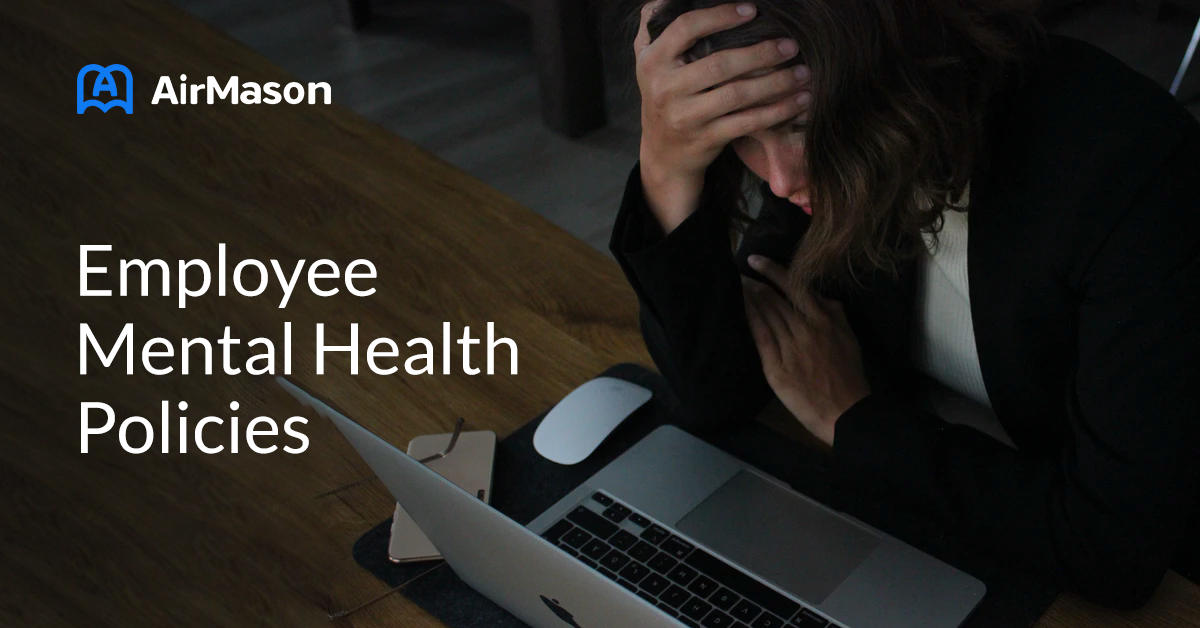
This decade has been surprising. With many changes to our everyday life, a new responsibility has emerged for employers in the modern digital age – employee mental health.
Making sure that your employees mental health is supported by their organization is a responsibility in demand by employees today. A survey conducted by The Conference Board found that 59% of employees named stress and burnout as their top concern for workplace well-being. Knowing this, employers must keep these needs actively in mind and strive towards a workplace that emphasizes well-being and employee mental health.
Mental health is just as important as physical health, and without the proper support from your organization, your employees will never be engaged at their highest level. These policies and benefits are not only essential to your current employees but serve as an important consideration for future hires as well.
Today, we ll be providing you with a checklist with key information regarding essential mental health policies that you need to guarantee employees to create a thriving workplace.
Medical Insurance that supports mental health
Modern employers have embraced the responsibility of providing insurance packages and benefits to their employees. However, oftentimes these benefits tend to be lacking in services regarding mental healthcare such as therapy. 85% of employees said that behavioural health benefits were important when evaluating a new job. These behavioural health benefits came ahead of many other offered workplace benefits.
Mental healthcare is an increasingly relevant aspect of current society. As employers, it is an essential responsibility to provide financial support for mental care. The first step in the checklist is offering support for your employees outside of work.
Having an employee handbook with mental health information
Here at AirMason, we ve helped companies write incredible employee handbooks. We do this because we believe that policies and benefits should be easily accessible to employees. By having an employee handbook brimming with mental health policies and tools that employees can access, the friction between employees seeking help and employees receiving help is significantly reduced, if not eliminated.
As an organization, large-scale efforts must be made to help your employees access mental health care whenever required. Having these policies easily reachable is the first step towards organizational mental health transformation.
Mental health days
Have you ever experienced a day where you needed to set aside time for yourself to mentally recharge and recoup? After stressful situations where employees are overexerted, employers should be receptive to offering employees the opportunity to not work and instead mentally recover.
Accounting firm PwC is encouraging employees to block Fridays after 12:30 p.m. local time as non-bookable times on their calendars, allowing for FlexFridays . This gives employees the uninterrupted block for anything to focus on work to fully taking time off, helping them feel looked after by their company and allowing for a mental recharge.
This in turn will allow for your employees to be more engaged when they have recovered, thus producing better results and efficiency within your team. By being aware of the mental health needs of your employees, it paves the way for appreciation towards the organization’s focus on employee mental health, thus decreasing turnover.
Avoiding strict deadlines during times of stress
Deadlines and tasks are an incredibly important part of any organization. However, what must always be kept in mind is the mental impact that deadlines can have in high-stress situations in the workplace.
For example, in a situation where you are aware that an employee has a heavy workload, it would be best to be considerate when assigning more work to them. Allowing the employee to complete this new task once other tasks are finished, or waiting to assign this task to them in the first place, is an essential step in positively affecting employee mental health and can make an incredible difference.
A time will always come where deadlines just can t wait and employees have more than usual on their plate. However, prioritizing the needs of these employees and keeping their mental health in mind in the first place is the only way in which a company can thrive on a healthy, balanced, and productive foundation. It s time to make employees feel seen as individuals, and that their role in the company is seen as absolutely vital and well looked after.
Promote mental health strategies within the workplace
For many people, mental health issues can arise from the stress of the workplace. On the other hand, organizations that create strategies and plans to promote mental wellness confront this problem head-on to boost the overall potential and productivity of their employees.
Mental health strategies can take shape in various ways depending on the needs of your organization. We recommend visiting Workplace Strategies for Mental Health and The Working Mind to learn more about examples of workplace mental health strategies that you should be implementing.
Reduce stigma and boost mental health literacy
Workers need a safe and supportive environment to work in. Part of that is helping all of your employees learn about the effects of mental health, and how focusing on your mental wellbeing should not be stigmatized or seen negatively. By creating an open dialogue surrounding employee mental health, your workplace will work towards destigmatizing mental health.
Mental health literacy is incredibly important for employees to understand so that they can freely and confidently ask for help free of shame. We suggest using the tools available through the Mental Health Commission of Canada to create strategies necessary to ensure your employees are aware of their mental health literacy in the workplace.
Checking in with employees
The final mental health policy that we recommend is one of the simplest but arguably the most beneficial. That is, taking the time to check on your employees and their mental health.
Studies have shown that at times, workers can feel alienated from those around them at work for various reasons such as being kept in the dark. Keeping your employees equally up to date on projects avoids unnecessary feelings of alienation and potential hostility towards one another while their mental health may be suffering from it.
Some examples of that include projecting disrespect onto employees. The number one reason employees begin to feel alienated and their mental health takes a turn for the worse is when they feel as though they are undervalued.
One big way to avoid this would be to praise employees for the work they have done and make them understand that they are one crucial part of a bigger whole, that their work matters.
Taking the effort to go and speak with employees shows them that they aren t alone. For employee mental health, showing that you actively care about how the employee is doing and that you are there for them may just be the spark needed for their mental health to improve. Additionally, providing them with resources and additional mental health information can be an incredibly useful tool for them.
Mental health needs to take priority in the workplace
With the strategies listed above, it is clear that there are several ways that employers can take responsibility and get their employees mental health on the right track to feeling valued in the workplace. Employees with unresolved depression experience a 35% reduction in productivity, which is why prioritizing employee mental healthcare not only benefits the employees but only brings great long-term results to your company.
Now is the time for employers to be focused on employee mental health policies. If you re curious about how to set this plan in motion, or how to get started with creating an employee handbook that s easily accessible for all employees, get in touch today and book a demo here to learn more about how AirMason can help!


